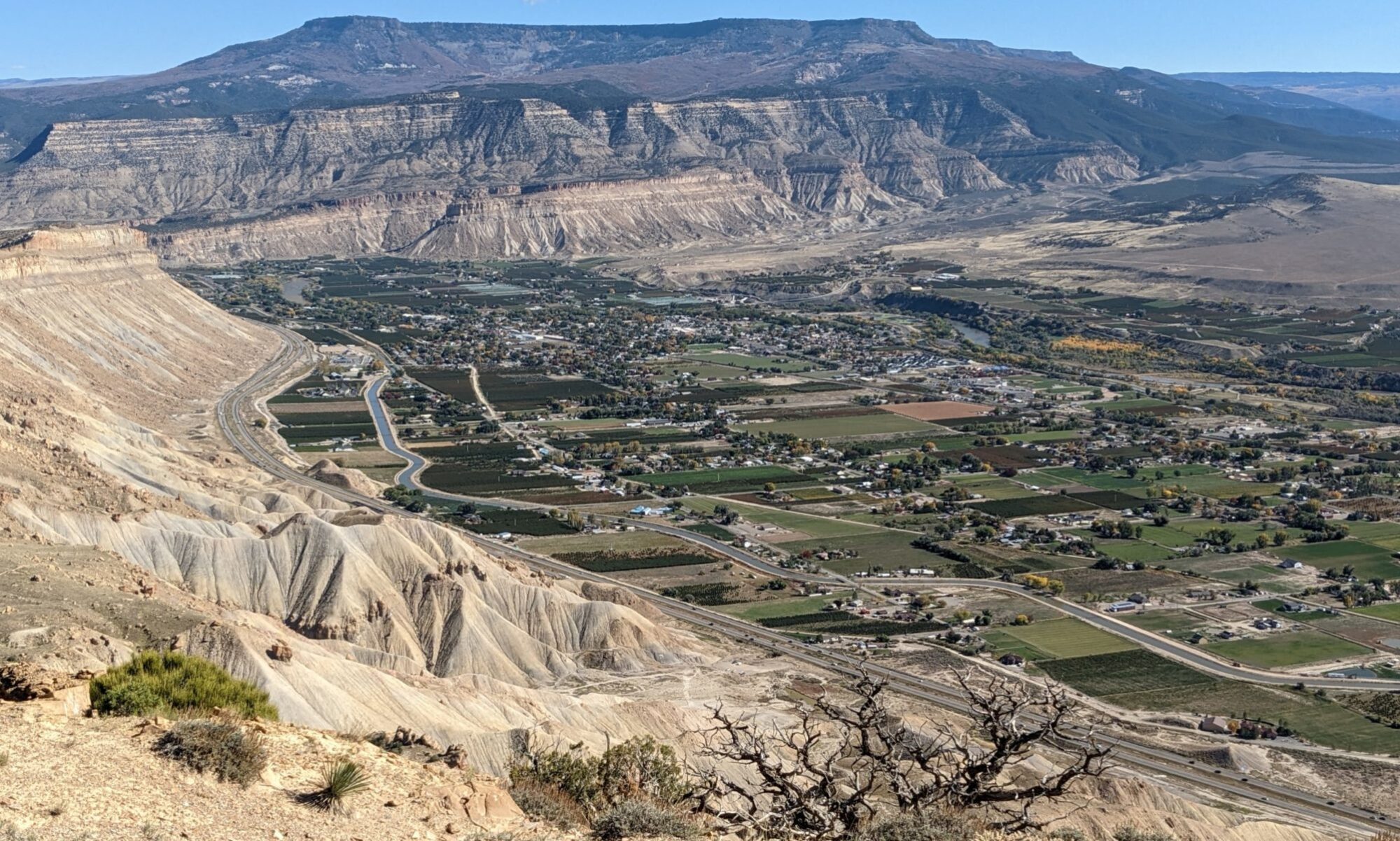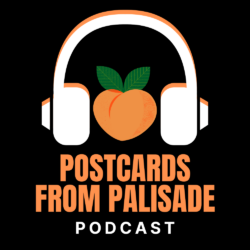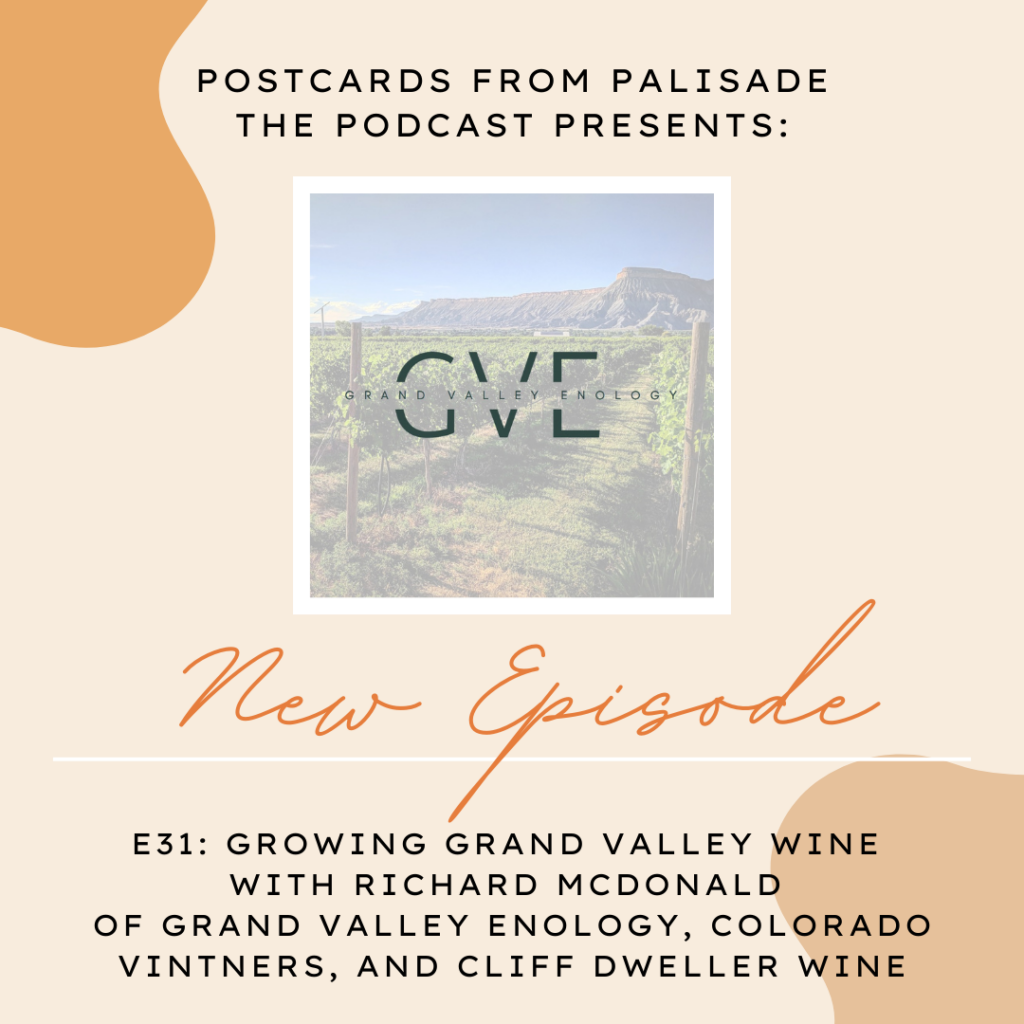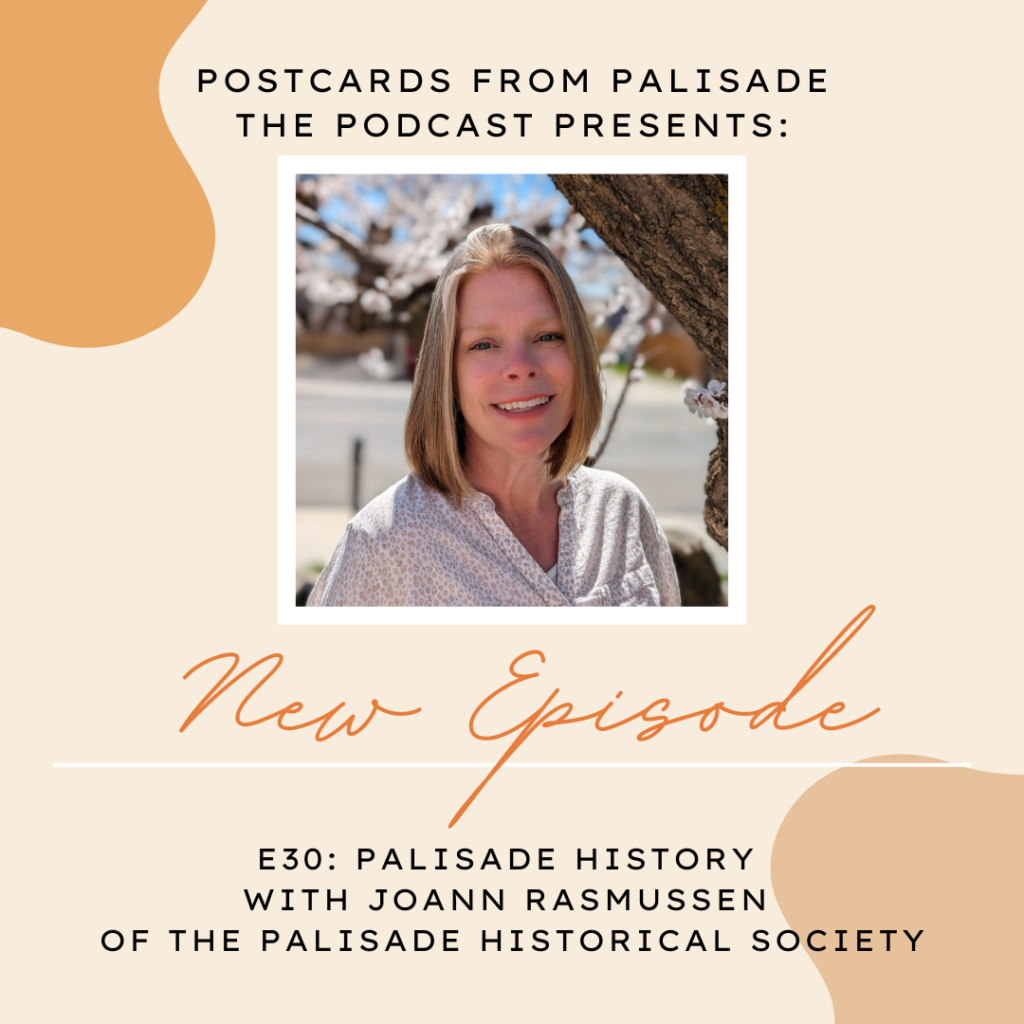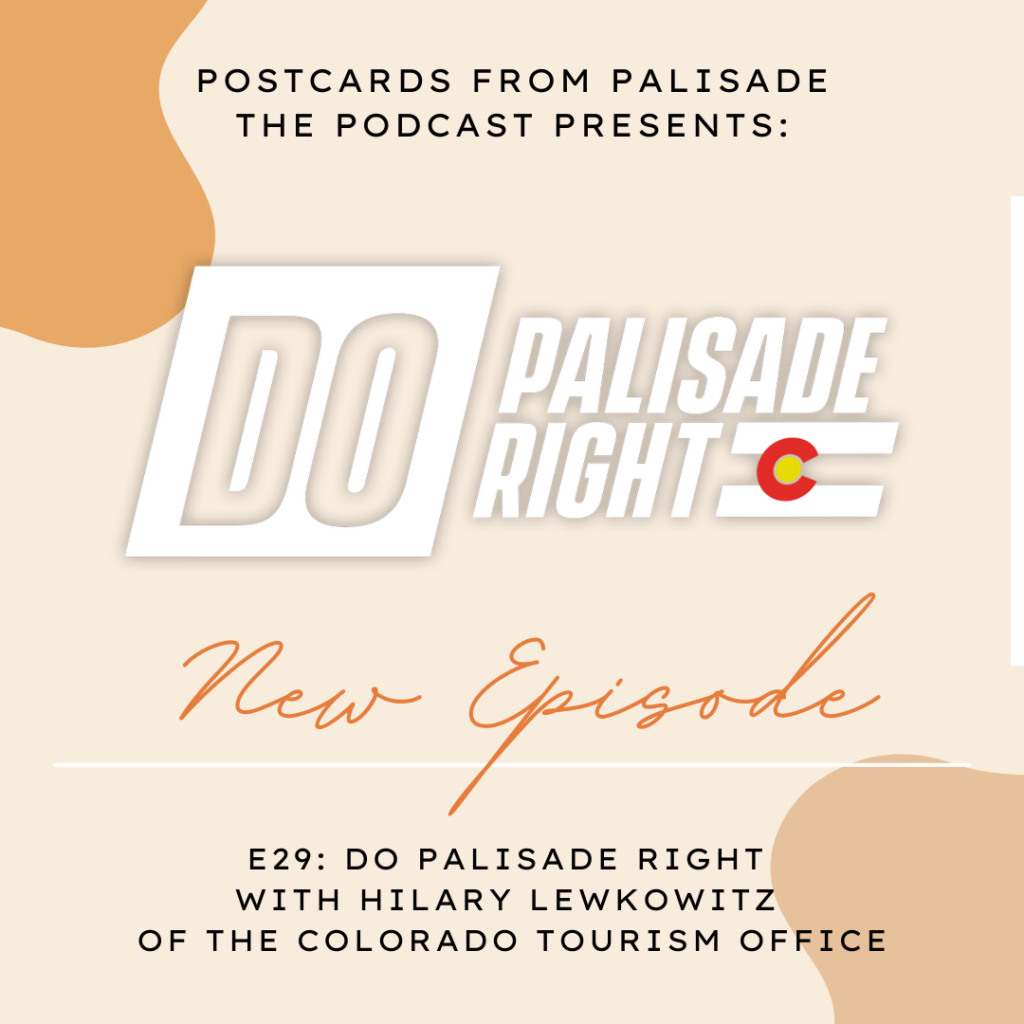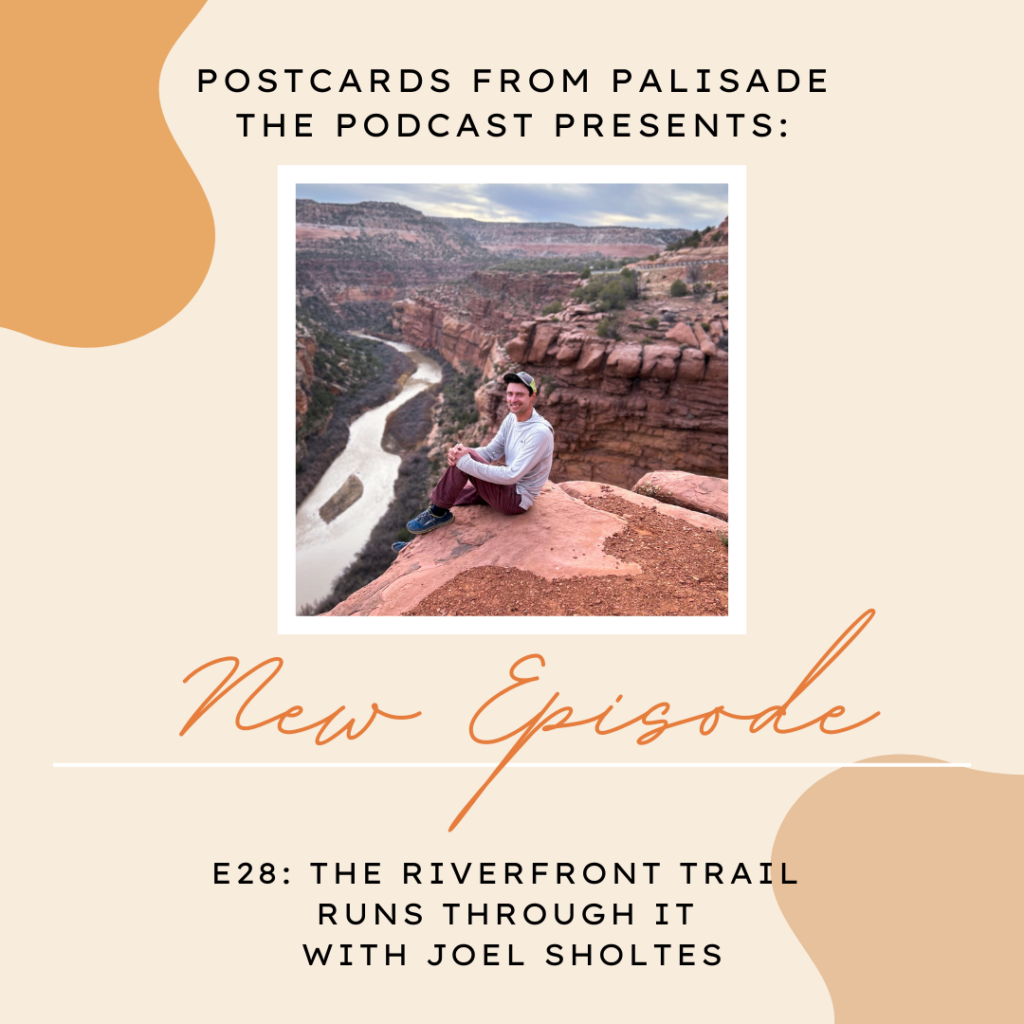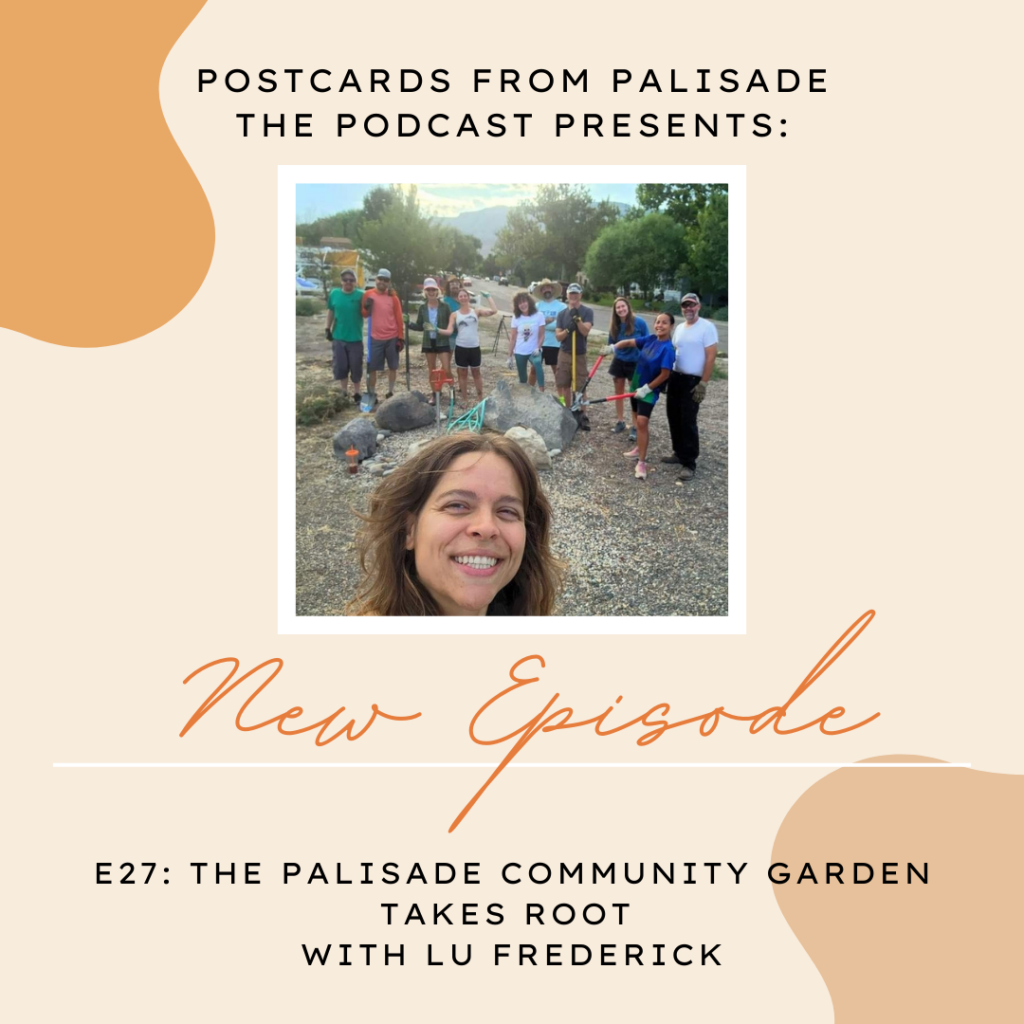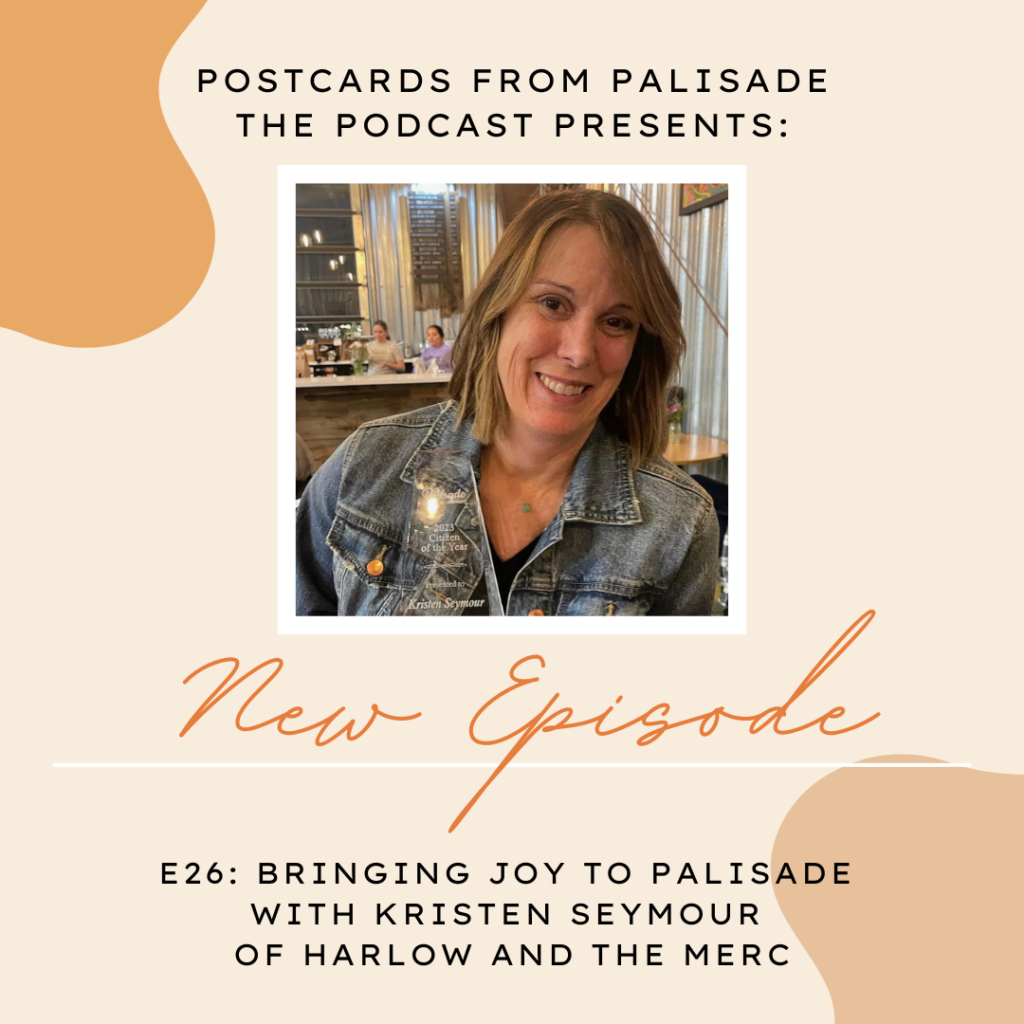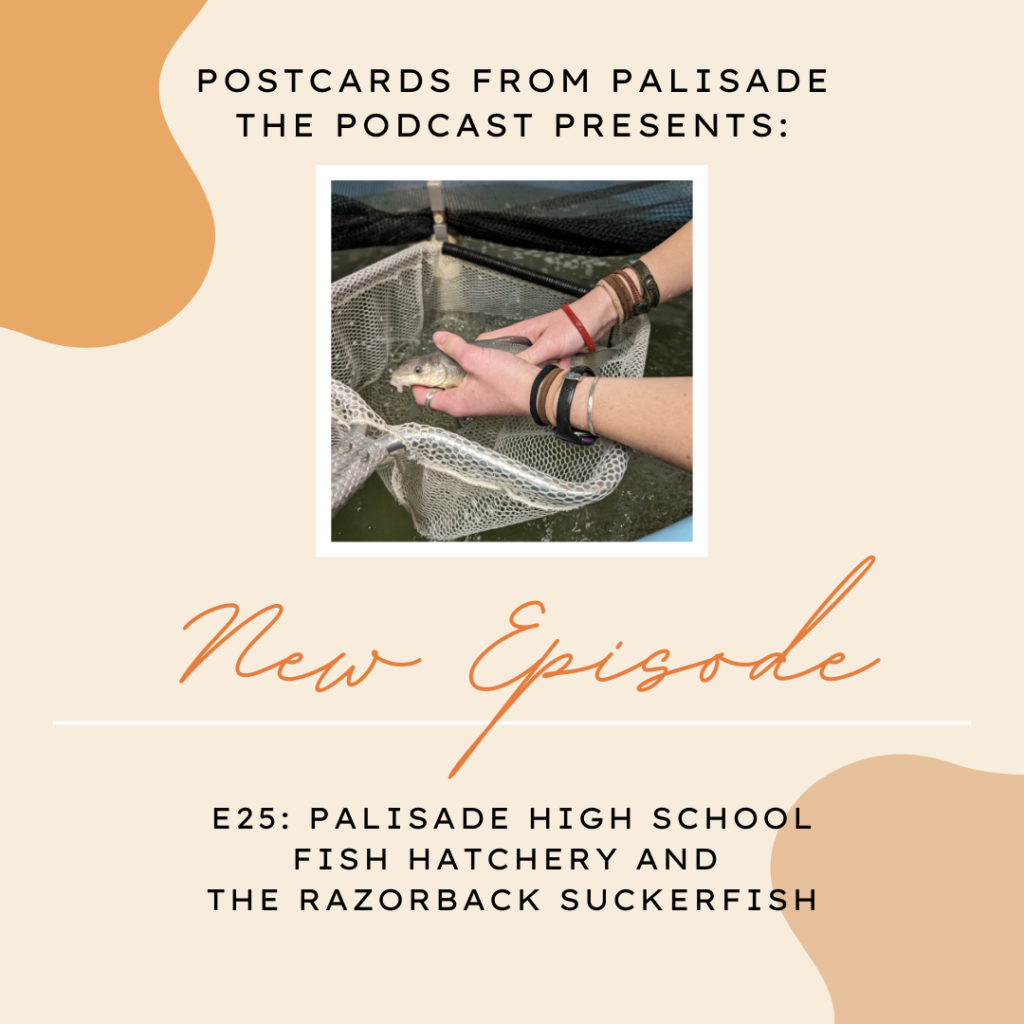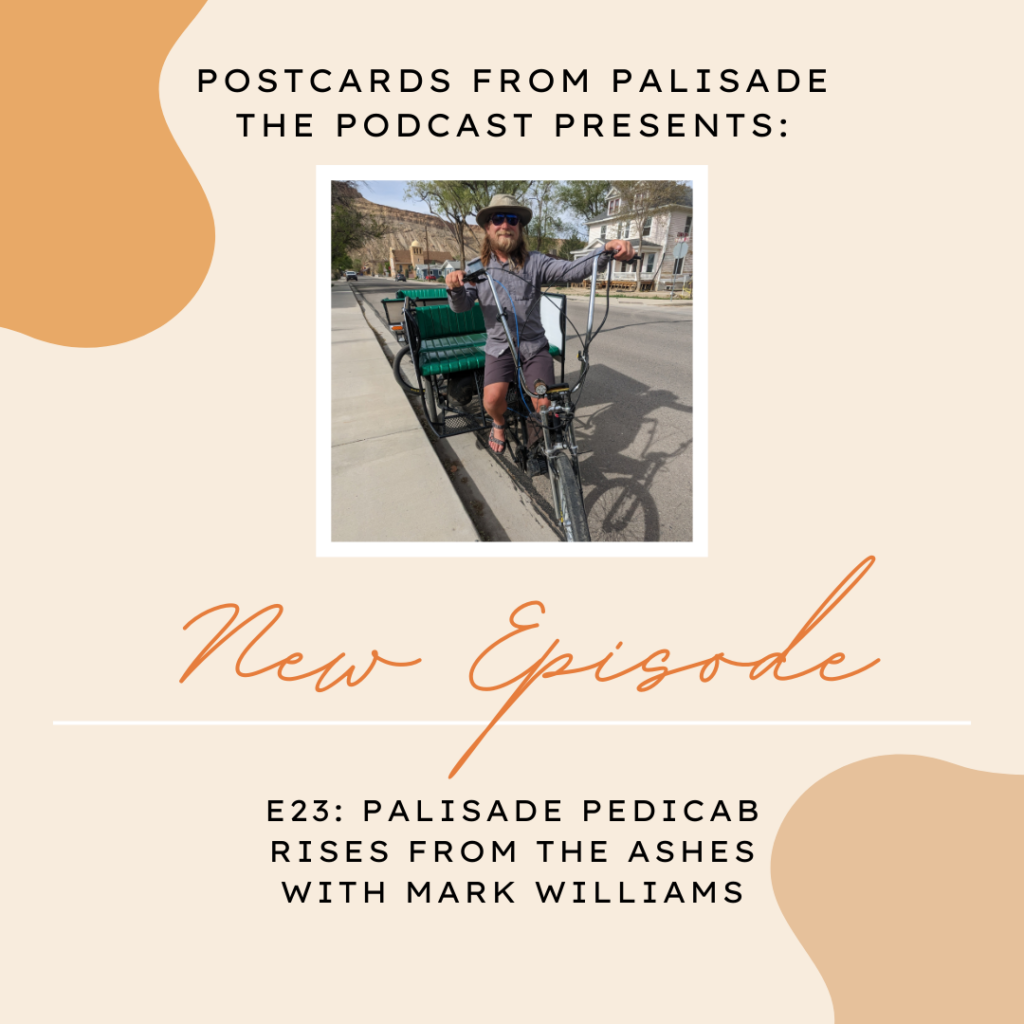Wake up your wanderlust with this episode featuring Sarah Steele, travel advisor with Find Your Why Travel: Wine Edition. Sarah grew up in Palisade and after living around the world, found her way back to the western slope and to Colorado wine.
Sarah and I chat about why she loves to bring Colorado wine to France and how you can take part in that kind of adventure, why travel agents/advisors are still very necessary, why group wine trips are so much fun, and why no wine or wine making style is bad (especially when you’re on vacation). Sarah also shares some of the cool things she’s learned about winemaking techniques in places like Georgia (the country) and Croatia and why some of her best travel experiences happened when she faced her fears.
For more about Sarah and Find Your Why Travel: Wine Edition, email her at sarah@findyourwhytravel.com or go to wineadventureswithsarah.com.
Theme Music: Riverbend by Geoff Roper.
Photo Credit: Hilary Stumpus
Subscribe:
Transcript:
Welcome to Postcards From Palisade, where we hear from the people who are shaping our slice of western Colorado. I’m Lisa McNamara.
It’s the time of year when all winter-denialists, myself maybe leading that pack, have to admit that cold weather is here to stay for a few months. What better time, then, to daydream about travel?
Today I’m talking with Sarah Steele. Sarah is a travel advisor with Find Your Why Travel: Wine Edition. Sarah grew up in Palisade and after living around the world, found her way back to the western slope and to Colorado wine.
Sarah and I chat about why she loves to bring Colorado wine to France and how you can take part in that kind of adventure, why travel agents/advisors are still very necessary, why group wine trips are so much fun, and why no wine or wine making style is bad (especially when you’re on vacation). Sarah also shares some of the cool things she’s learned about winemaking techniques in places like Georgia (the country) and Croatia and why some of her best travel experiences happened when she faced her fears. I learned a few things I didn’t know and my wanderlust is fully awake after chatting with Sarah!
A quick aside before we get started: if you’re interested in finding out what’s happening in Palisade every week in one easy to read list, I have started a substack called Palisade Weekly Calendar. Each Monday, I publish a list of everything that I can find that’s happening in Palisade that week, from town and library events to live music to happy hour deals and everything in between. It’s a huge list. Find past issues and subscribe to future updates. It’s just one more way I am trying to help connect neighbors and support our local businesses, so we can all continue to make Palisade a great place to live. UDPATE AS OF SEPTEMBER 2025, the event site has moved to: All Things Palisade.
But let’s get back to the subject at hand – wine and travel, on today’s Postcard from Palisade.
SS: my name is Sarah and I started Find Your Why Travel: Wine Edition, which is a wine focused, travel company. So I wanted to bring people from the States to international wine destinations and I wanted to make sure that people were having really intimate experiences that allow them to explore areas that maybe they wouldn’t necessarily be able to because maybe they’re off the beaten path and people don’t necessarily have that connection. You know there’s gonna be things that keep people from being able to have those types of experiences, whether it’s language barrier, whether it’s savviness of travel, whether it’s fear, because we all have fear sometimes of going places and experiencing new places that are unfamiliar and kind of out of your comfort zone.
And also another thing is, I’m going to start doing local tours, with people from Aspen because that’s where I live. So I wanted to bring more awareness to Colorado wine and I wanted to bring people that are coming from all over the world, but also people that are coming, you know, from California, New York and places that people don’t associate Colorado and wine in the same sentence. It’s not something that’s a common thing. So I want to bring more awareness to Palisade because it’s my hometown and this is where I grew up. As somebody who grew up here, if you’re from Palisade or you live in Palisade or you know anything about Palisade, it’s evolved a lot as far as our mindset is concerned, as a community. But when I grew up here, it was more close minded and I just felt like I needed to explore the world and see other things because I kind of felt sheltered in a way.
LM: Sure. And I saw in your bio you’ve lived in five different countries. I think so, what countries have you lived in?
SS: It’s ironic. It’s kind of come full circle for me because I lived in five of the top wine producing countries in the world. But I wasn’t into wine at that point. I mean, I was, but not in the way that I am now. It was kind of like, oh, I would drink wine, I had a relationship with wine. But once I moved up to Aspen when I was 19, I had the ability to really experience connecting with people from all over the world because it’s such a melting pot of people that travel there. And so it really broadened my ability to connect with people from other countries and other cultures. And so it just inspired me to kind of explore the world. And so I moved to France and I was a nanny there for about 10 months. And then I moved to Australia and I was there for a year and then I was in New Zealand for a year and I backpacked and picked grapes and worked on vineyards and that was really fun. and then I moved to Italy and I was there and I was a nanny. and then I lived in South Africa.
And that I think was kind of that pivotal moment where I was getting older and I was kind of really starting to think, okay, well, I still love travel, but it felt very organic when I experienced going to some different wineries and just kind of learning more about wine in general and the history of wine. And then, I ended up wanting just to make wine as a hobby. And then I came back to Colorado and I was gonna actually travel again and start teaching English in South America. And then there was this brand new viticulture and enology program at the college. And I thought, oh, well, I mean, it’s something I’m interested in. Maybe I just try it.
Going back to college at 29 is. Can be intimidating. And so I decided to go back and I did. And it just kind of. It just organically unraveled and just turned into something that was completely different. And then Covid happened. And you know, that was also part of why I wanted to do this was because I knew if I worked in wine, I could travel internationally and work different harvests all over the world. And so that was some of the driving force behind it as well because I knew I always wanted to do something that had to do with travel. but I didn’t know it would also be wine related as well.
LM: Yeah and so those things just totally came together. It was like you couldn’t have even planned that.
SS: No, no. And then of course it happened in my hometown where I grew up surrounded by wine. And so, now, you know, because before I thought, oh, I’ll never move back to Palisade or Grand Junction. I never want to be back there again. You know, I want to be as far away as possible. And now it’s such a huge piece of my life and a big part of my heart and soul being here, and still coming home. And I mean, even just driving in today, I was like, oh, it feels like home still.
LM: Yeah, that’s so interesting. I mean, what a, cool experience to have. And so it sounds like you really kind of supported yourself as you worked around the world. what was your favorite place that you lived?
SS: Oh, that’s always such a hard question, to answer because I loved everywhere for different reasons, but I think South Africa is really special just because it was, you know, Europe is Europe and which is amazing. But it’s comfortable in a sense. Maybe not comfortable for people that don’t travel all the time, but it’s more comfortable than other places in the world.
You know, and then Australia, I felt very, you know, everyone speaks English. Everyone speaks English in New Zealand. but South Africa was something that was so out of my comfort zone, in so many ways. Whether that was, the language, the people. South Africa is not the safest place and I’m a white woman from America, you know, and so I think that traveling there from time to time, I took the bus at one point and did the garden route and was traveling by myself. And that was really intimidating.
There’s moments where when you’re traveling, you have this fear of whatever it may be because you read stuff online, you know, and almost that’s. I sometimes think that that’s almost not the right thing to do is to freak yourself out before you travel because it’s other people’s experiences that you’re reading about. when I went, I was like, okay, I’m going to do this. And I was pretty nervous. And then once I was there, it was like, okay, I got this. Like, you just. I just need to be secure in my ability to travel and know how to conduct myself. And I ended up meeting a lot of really beautiful people.
And it also puts things into perspective about your life and what you do have and what you should be or not should be, but what you are grateful for and your community when you do come home, you know, and the simple things, you know, running water and being able to use the restroom, public restrooms and, and you have a meal every day and, you know, just those little things. And so I would say obviously it’s a special place in my heart just because it’s something that really was a pivotal moment for where I am now. but also I love Italy. It’s just one of my favorite countries in the whole world. The language, the people, the food. I mean, who doesn’t, who doesn’t love it? So.
LM: I don’t know. It’s impossible.
SS: Well, and recently I was in Croatia. and Croatia is incredible. I mean, that’s a trip I’m working on putting a group together to do wine there because I think it’s an untapped place for wine. Croatia is definitely like on my top three of places that I love.
LM: And like Croatia, I mean, is a lot of grape varietals and things like, started in Croatia. Right. It’s the origin for a lot of different things like Zinfandel and things like that.
SS: Yeah, exactly.
LM: Which is my favorite wine. That’s why I know that.
SS: Exactly. Yeah. And people don’t realize that Zinfandel is from Croatia, which is really fascinating.
LM: Yeah. There’s just so much history. well, so one of the trips. I know that you do, I think you do this regularly, but the Palisade wine, bringing Palisade wine to France, I definitely want to know more about that and understand how that whole idea came about, what you do and how people react to it when you’re there.
SS: So we just did. We did. A group of us went to Bordeaux back in March. and so the concept is with a river cruise company out of. Excuse me, out of Europe. they’re based in Europe, their family owned. And they’re a wonderful company to work with. I don’t. I’m not an employee, but I’m a travel advisor that works with them. And their goal with these, river cruises that are specifically wine focused. So they’re the celebration of wine cruises. And so what they do is they look at North American winemakers and they, rely on maybe the travel advisor like me that goes out and seeks people that would like to host a cruise and bring their wine over to Europe and not in a comparison way, but to look at them and see how they’re similar and how they’re different, but not in like a quality to be like whose is better. It’s not a competition. It’s more about understanding terroir, understanding, you know, style and really understanding old world versus new world style of wines. Because sometimes it’s a hard concept to grasp and understand, but when you get to actually go there and see the way that it’s made and talk to the winemakers and understand their historical way of winemaking, because it’s, I mean, for them it’s generations after generations of family that have been passing down these wineries. And so it’s very. They’re very rooted in who they are and what they’re doing and their ability to continuously make consistent, really amazing wine.
Again, this is another way to bring more awareness to Colorado wines because based on the wineries, you know, they’re sending their wine over and they’re exposing themselves to other demographics of people that maybe didn’t even realize that there was wine, in Colorado and we were, there was a winery that had previously done a trip, to Europe similar to this, I think it was with AMA and they were a, ah, Eastern Slope Winery. And then Jenne Baldwin Eaton, she has, she hosted my Bordeaux trip and then she’s also hosting another one this coming July and we’re going to do the Rhone Valley.
I think because a lot of our wineries here are a lot smaller they don’t maybe necessarily have the volume of wine to send over. And so I was trying to figure out a way to kind of diversify the trip and bring more awareness to multiple wineries in the area. And obviously Jenne is one of the most influential women in Colorado when it comes to wine. And I’m so glad that she was my professor and the director of the program at the school because I just feel like she’s been such an incredible mentor and such a great support. and I definitely like wouldn’t be where I am now without her. And I just learned so much. And so now that she’s retired, kind of low key, she’s trying but you know, she just, she loves, she loves doing what she, what she does. And wine.
LM: It’s not work. If you really love it, it’s not work.
SS: Yeah, yeah. And she still continuously works in the valley with different wineries consulting and is still a huge support. And it’s just such an ambassador for, for Colorado and our wine and so, I reached out to her and just said, would you be interested in hosting a trip? Because obviously, all these wineries that we work with really trust that you’re going to bring awareness, but you’re such a good person to talk about their wines and know about their wines. And so she was a great person to be the host along with these other wineries.
So, the first one we did in Bordeaux, we had Restoration, Red Fox and Vines79. And we had a huge group, and it was so much fun. We had such a great time, and everyone just. They loved it. And, I mean, people made new friends. You know, there were people that didn’t know each other. And, you know, since then, we’ve kind of had little groups where we’re like, let’s get together and talk about the trip. And, you know, now we’re. It brought our community closer in someways as well, which has been really great.
and so then this next one that we have, that’s going to be on, the Rhone, that is going to be in July, and we are gonna have BookCliff Vineyards and Whitewater Hill as our two wineries that are going to be going on. On this. This cruise. And, we also look at wineries that. That have some of the same varietals that are indigenous in that area, in those specific areas. because we want to also showcase their wines and how they’re similar and how they’re different to those wines in that region.
LM: That’s fascinating. So that’s gonna be more like Riesling? White wines or?
SS: No, so it’s going to be. We’re looking at, like, Grenache Syrah, Mouvedre. Like, I would say Syrah is probably the main star. and then we’re gonna throw in some, you know, little surprises in there. But, Yeah it’ll be. It’ll be really great. It’ll be a really great trip.
LM: Okay, you said that’s in July.
SS: Yeah, so that’s July. It’s for a week. It’s really great because it’s. Those trips are all inclusive.
LM: So you just get on the boat and you just enjoy yourself. For a week!
SS: Yeah. Well, and the best part is that, it’s a river cruise. So they’re a lot smaller. The boats are a lot smaller. You’re looking at about 150 people. and that just allows a lot more intimacy within the experience. But also, I mean, you end up making new friends because you can sit at dinner with everybody on a different night and get to know other people. But also because it’s a river cruise, it’s really unique in the sense that it’s not an ocean cruise where it’s you and 20,000 other people or 10,000 other people and you’re all fighting to go do the same activities at all the ports. You know, this is. You travel a lot at night, so you’re getting a maximum amount of experiences when you’re ported during the day. And sometimes we even stay overnight. So if you don’t want to have dinner on the boat, you can venture out and go do other things.
But the other thing is that you’re always in a port where you’re close to a lot of things. So you can just walk right off the boat and go straight to a restaurant or go to a museum. And a lot of the excursions that we do offer, they vary. So you know, you could go bike riding like in the summer when we do this July one actually the Tour de France is going to be going through there as well.
LM: that’s cool.
SS: yeah, I’ve been working with the cruise company to see if we could do some type of special excursion, while we’re there to see it. Because they’re really accommodating with that kind of stuff. but also, it’s really great because every excursion is broken up into multiple smaller groups. So everybody has a different experience. And so, you know,
LM: so you have something talk about. At dinner. You’re like, what did you do today?
SS: Yeah, exactly, exactly. And even if so say it’s the same excursion in the sense that you’re gonna go to do a specific wine tasting that day. Each smaller group goes to different wineries. So they have completely different experiences. And so then you come back and you’re like, oh my gosh, what did you experience? Where did you go? What was the wine like? it really allows for a lot of connection and interaction with, with other people that had a similar experience, but it was totally different.
and then one of the really great things that we do on board is with the wines that come over from Colorado, we do a wine pairing dinner. Jenne, for instance, or the host, they’ll sit with the chef and they’ll put together a wine pairing menu with the wines that we have sent over. which is really cool because it’s just a completely different experience because you’re. You’re tasting local cuisine with wine that’s from Colorado, which is. Yeah, it gives me the chills just thinking about it, because we had such a great experience this last time in March. But then we also do some. Jenne will get up and, do some workshops with the wine as well. So she’ll pour some of the wine blind. And then it’s fun because we kind of get to pick and choose. Like, do you think this is a local wine? Or do you think this is a Colorado wine?
LM: that would be fun.
SS: What style of wine do you think this is? And then she kind of goes into the actual, like, learning and teaching about the wine in that area and how. How the Colorado wines might differ stylistically or terroir wise to the local wins that she’s pouring.
LM: awesome. that sounds like an amazing experience.
SS: It’s so much fun. We had so much fun on this last trip.
LM: So it’s, like, fun for you too?
SS: Yeah, yeah, it’s so fun. And that’s part of it, right? That’s part of why I really enjoy doing this, is because I just love seeing people light up and travel and have fun and get out of their comfort zone and learn something new and get excited for travel. And it makes me even more excited to see people that I know that are local, that we get to share this experience together. But also, you know, bringing the Colorado wines, I think is something that’s just extra special and unique for me because it’s like, I get to bring “home” with me on these trips and share it with people.
LM: To what you were talking about earlier with why a travel advisor is important, why you’re not obsolete, would you. How would you answer that? So why would you say you need to work with a travel advisor, and this is what I can do for you that, Expedia won’t do.
SS: Yeah. Well. And, you know, it’s interesting. Okay. Yes, Expedia is. I don’t want to say it’s basic, but it. It has kind of set the tone for people to book flights and hotels. That’s pretty common. That’s a pretty easy thing.
LM: like, utilitarian.
SS: Yeah. You know, and that’s based on reviews and what other people say, but sometimes you’ll find that it’s not always super reliable and you could book something and then the booking doesn’t go through and then you find out right before you leave and then you didn’t book directly through the company and you know, it’s a third party.
I had my own personal experience when Covid happened. I had bought a ticket through Expedia or something to go to the Philippines and I had to fight to get my money back because it was through a third party company. I. The amount of time that I wasted in doing that. And so when you have a travel advisor that is knowledgeable about who to work with, they’re the ones that go to bat for you if something goes wrong. You know, they’re there for support while you’re traveling.
But also, we’re such a great tool and we’re such a great resource for people because, yeah, you book it yourself, but what if something happens? the amount of time that you spend on the phone with the airlines, or on the phone with, making sure that your hotel room is right. for what I do as far as wine trips are concerned, you know, when you’re trying to travel, you travel to Napa, okay, go online, Google, what are the best…
LM: best wineries in Napa!
SS: 100% right? And then you make a reservation online. Well, you don’t have that same ability to do that, while you’re in Europe. I mean, I put together a trip for a gentleman who wanted to spend a week in the Rhone Valley. And I strategically had to look at the location of all the wineries. I strategically, I mean, I was emailing, calling. A lot of them are small, they don’t speak English. I spent a lot of time on the phone connecting and reaching out to these wineries that you can’t just go online and make a reservation.
LM: Right.
SS: And so for him, he just showed up and was like, okay, I’m here, you know. And so I did a lot of that legwork for him, which allows for you to go and have an experience that just. You didn’t have to stress about it. You didn’t have to like put all the, I mean, I literally drew a map of where the different wineries were that he preferred and the distance between them. You know, things that you don’t really think about when you’re putting these types of trips together, but also knowing in the hotels, knowing some of the experiences that I’ve experienced myself that I can say, oh my gosh, you’re gonna love this. I mean, he went to Chapoutier in the Rhone Valley, which is one of the top wineries in France, and especially in that region. And I hiked through the vineyards, and I said, this is something you have to do. And he did it and he said it was incredible.
LM: so you’re getting that benefit of your experience, your research and all of the, all the like quote unquote work you’ve done.
SS: Yeah.
LM: Finding all these places.
SS: Exactly. And building their relationships with people. And that’s the other thing is people think, oh, I can just go on and go into chat GPT and go on to AI. Right. Well, it’s not gonna. Well, it’s funny, because.
LM: You don’t know what you’re gonna get.
SS: There’s this woman who she did a whole like webinar on it. And she, she was like, okay, it’s me versus AI because she specializes in Disney trips. And so she put in, okay, this is, this is what the client wants, and this is what the client told her that she wanted. And she looked at what AI came up with versus what she had and she was like, no, I totally win. Like she, she went back and forth and was like, no, the way that they laid it out and laid the trip out and had everything. She’s like, they’re not gonna get the same tailored intimate experience that is gonna blow them away.
LM: Right. Because Chat GPT or AI or whatever, it’s just taking the average. It’s taking the averages of everybody’s experiences.
SS: Yeah, exactly.
LM: Who wants average? But you know, earlier I thought you said Rhine, not Rhone. So sorry about that.
SS: No, that’s okay. Oh, Riesling. Yeah.
LM: And I’m like, oh, wait a second. but I know this isn’t the same, but even corporate wise. So I traveled a ton for work. Traveled a ton for work. And things always go wrong. I worked with a travel agency. You know, all you have to do is just call them and say, hey, my flight got canceled. Can you help me? And they, you know, hang up the phone, go back to sleep, they rebook you. It’s like incredibly wonderful to just have so you’re not in the middle of this already annoying situation, having to figure it out yourself. You’re just like, hey, this happened. Can you help me out? And then they do and it’s like magic. So I know that’s not the same, but, like, the benefit of having somebody to call to help you when things go wrong, who actually knows what they’re doing and knows the, places and the companies. It’s invaluable.
SS: Yeah! Well, and the fact that, I love doing groups because I love having these experiences with people. But, you know, it really helps when I’m there and I’m on the ground, because, there was a group of some of my clients, and they came in on the train, and then for some reason in Bordeaux, their local, like, tram system just stopped working. And so I was trying to come to meet them at the train station, and I was like, I can’t get there. And they’re like, well, okay, well, what do we do? So I’m there on the ground. Problem solving. I’m like, okay, this is what we’re going to do, you know? And then eventually they got there and it was. And they were so thankful that I was there to help get them to where they needed to be and was there to support them.
And then, I had some clients whose suitcases got lost and so then they called me and I was like, okay, let me. I’m gonna call the company. We’re gonna, we’re gonna get this sorted. And we did. And it just, it, it was so. I want them to rely on me. I want them to know that I’m here to support them and help them have the best experience, because that’s what I’m here for. And I really enjoy it. It’s something that I really, really like to do. And I love knowing that because I’ve been there, I’ve been that stressed out person that was like, man, I really wish I had somebody to just take care of this for me!
And because I’ve traveled so much, it’s these little things that maybe you wouldn’t think about until you’re in it. You’re like, oh, man, I really wish that I would have foreseen that these are all the things that could possibly happen, like my passport. My passport went missing when I was living in France, so I had to go to Paris by myself, speaking no French. And I’m in Paris by myself all day trying to, like, navigate the train system, and trying to navigate getting to the embassy and getting a new passport and getting a new photo. And, you know, this was, this was years ago, so now it’s a little bit easier, but it’s still scary.
LM: Yeah.
SS: and it was something that I was like, okay, well now I know that you always take a photocopy of your passport. You take a few. You have one on your phone, you have one in your email. You know, there’s just certain things that again, you don’t think about and then it happens and you’re like, oh, so that’s again, that’s why I’m here to be like, these are all the potential situations that you can find yourself into and these are all the ways that we can solve them.
LM: Yeah. So like, you’ve lived it.
SS: Yeah, exactly.
LM: I’ve lived this. So you don’t have to.
SS: Yeah, exactly. Let me be the one that goes through these experiences so that you don’t have to. Because it could be stressful and sometimes it can like ruin your trip.
LM: Yeah. Definitely.
SS: You know, and I just don’t want, I don’t want people to do that. And again, I think it’s, I think it’s fun. Some people don’t think it’s fun to plan a trip. They’re kind of like, I just want it to be easy.
LM: you mentioned that you were just in El Salvador and Mexico. do you have any, upcoming trips planned that are in the future that you’re excited about other than the July trip?
SS: so, well I was just in Croatia, so I’m working on a Croatia wine trip for 2026. I did have an Argentina and Chile trip planned for this February, March. but unfortunately it didn’t fill up. So, and that trip was, I’m going to shift it and move it, to 2026 just because it’s a really incredible trip. But I think Argentina is difficult sometimes when it comes to putting together a group or pricing because their economy is so unstable. And so I was dealing with a lot of ups and downs of trying to get pricing and everything to plan that trip. you know, I don’t think I gave people enough time to make the plan to go on that trip. so yeah, Argentina and Chile. but it’s already built so I’m just gonna move it to 2026. so I’m working on dates and then we’ve got, I’ve got the Rhone one and then, I’m working on South Africa. and then just for something fun that’s not wine related, I’m doing a group to hike the Inca trail in Peru.
LM: You’re like naming all things that I want to do.
SS: in October of next year.
LM: Awesome.
SS: And then I’ve also put together a Portugal trip next September, which is going to be, you know, it’s, there’s a lot of people in Colorado that are really active. So it’s a hiking and winery, trip. So we’ll do hiking a lot throughout the day, but then at night, you know, we’ll stay at these little bed and breakfasts where we do like wine pairing dinners. And so it starts in Lisbon and ends in Porto. and then I’m also doing, I’m going to Greece, in May for a research trip and then I’m also doing a research trip in Sicily.
LM: Oh, awesome. that’s another place I really want to go.
SS: Yeah
LM: So your group tours or group trips, what, size you usually try to target.
SS: So with the river cruises they can be a little bit bigger just because, you know, they’re on a boat and they have the, we have the accommodations and all of that. But typically with, with my groups that I’m putting together, I don’t like to do more than 16, cause I typically like to stay in places that are smaller and more intimate. And so those tend to be, have less rooms, obviously, less mass hotels or anything like that. More bed and breakfast style. and then, you know, also you have to think about transportation. I don’t want people feeling like they’re in a giant tour bus. if we can’t all fit inside of like a transit or a smaller van, then I don’t really. I feel like that takes away from the intimacy and from the experience. because obviously the more people you travel with, the more personalities there are, you know, so it’s nice for people to feel like that they can kind of just do their own thing if they need to, but also interact with each other doing different experiences and excursions and stuff. So and then also when you’re going wine tasting, it’s a lot to bring a huge group to do a wine tasting, you know, but also get those really intimate, knowledgeable experiences. When you’re getting tours of vineyards you’re getting tours of cellars, or you’re doing these tastings, it’s like the smaller, the smaller, the better.
LM: Yeah. is there anywhere that you haven’t been that you’re just really itching to go?
SS: Yes. So this is a research trip that I’m trying to put together this year because I’m just really excited. But Georgia, Georgia the country. Because it is one of the oldest wine producing countries in the entire world. So orange wine has become, you know, a pretty known thing in the last few years and it’s trending. And they, I mean that’s basically where orange wine came from. Because their old style of winemaking was they would do it in what they call a, it could be pronounced multiple ways, but Kvevri, Qvevri. But they’re these terracotta pots that they basically put underground. Because underground your temperature is consistent.
So for winemaking back in the 1700s, 1600s there was no way for them to regulate temperature. And so they really had to find a way to make sure that while during fermentation, you know, that they could kind of control the temperature a little bit. Not control, but it’s a more controlled environment. It’s consistent. Right. If you bury something underground. But also in these terracotta pots, they allowed subtle amounts of breathing, but also it allowed the wine to be in a dark, cool environment as far as fermentation, because fermentation causes heat.
And so basically what they would do is they would just throw all the grapes in there and just let it ferment naturally with whatever the yeast that’s already occurring on the skins. Even white. Typically white wine is going to be white grapes that basically the juice is just pressed off and fermented so it’s not getting skin contact. And red wine is caused from the skin contact and that’s how it gets its color. So with white wine, what causes the orange color is the color extraction from the white grapes from the skins. And so for them, what they would do is they would just throw all the grapes into these terracotta pots underground and just put a lid on it and cover it with dirt and then come back, you know, a few months later.
LM: That’s amazing
SS: to check on it. Right. So like that. And they did that with red and white because obviously they didn’t know that was just how they did it. And so orange wine is very prevalent there. And they’re still very attached to their old style of winemaking. And it’s so fascinating because they’re still, you know, from an archaeological perspective, they’re still finding a lot of these pots that have been. That are like broken underground. But they’re still able to find, like, residue from wine.
LM: that’s so cool.
SS: Yeah. And so from a historical perspective, it’s super fascinating. But also just from a cultural perspective, you know, they’re not super known as a wine region, but they’re one of the oldest and some of the most experienced, even in comparison to like the French.
LM: Right.
SS: And so, Bulgaria, Romania, Hungary, like that whole area, that whole more like Eastern European area, they haven’t fully exploded from a tourism perspective. So, like, their infrastructure for tourism, isn’t touristy. And so you’re getting more of this intimate experience with locals that are, really sharing their story with you. And, you know, you re probably gonna hang out with someone’s grandma and she’s gonna want to pour you their family wine that they make. You know, whether it’s the best of the best, it’s still an experience. And so that’s really high on my list because it’s just such an interesting country and culture. And everyone that I’ve spoken to that’s been there has just like, they love it. It’s one of their favorite places and it’s so unknown.
And that’s kind of how Croatia was. Back before they became part of the EU and so now that they’re part of the EU, you know, and they’re on the Euro, it’s, definitely, it definitely has. Well, and the Game of Thrones that definitely brought a lot of knowledge to Croatia. But I was there back in like 2011, so it’s been almost 15 years since I’ve been there. And that’s when I really fell in love with it. And even when I just went back recently, the trip that I did was with this local family and I helped them make wine in a very traditional way. And they taught us how to make bread. And we did a cooking class and we went bike riding and we went to like this local fishing village.
LM: that sounds lovely
SS: I milked a goat! Like it was just. And this is the same experience that I want my clients to have. and then I went, to this other area and went wine tasting in Croatia. And again, I think they’re not super well known from a wine perspective, but they’re gaining more attraction. I think when people think about wine, they’re like, oh, France, Italy, Spain, and, and they’re beautiful and they make really amazing wine and it’s really great. But there’s also these other little hidden gems that I think deserve a lot of acknowledgment to what they’re doing.
LM: And it’s going to a be a different kind of experience. It’s what kind of experience you want to have. Do you want something real and authentic or something that maybe has a little bit more of a tourist layer on it, for lack of a better word. Well, that sounds really amazing.
SS: Yeah, it’s exciting.
LM: let’s see. What’s your favorite kind of wine? If you can pick.
SS: I think there’s a time and a place for everything, you know. and it’s funny because you think that you have a very like, specific winery that you don’t like a certain kind of wine, and then you try one from a different region or a different country and you’re like, oh my gosh. Okay. My perspective. So I think this is a really great example of understanding, you know, like, Riesling.
So we’re, not geographically, but, from a growing perspective in viticulture, I would say we’re pretty similar to Germany, which is why Riesling grows so well for us. And so, I was in Germany, we were on the Rhine because I actually. So I actually had another group go last July. I did not go on that trip, but it was with a Washington winery and they did the Rhine. And they started in Amsterdam and ended in Basel in Switzerland.
And I did a similar trip a few years before that with a different river cruise company. Not as a group, but just I went on my own. And I had always seen Riesling from a Colorado perspective. Yes, stylistically we were making it very sweet. Not a lot of dry. That’s just what worked for us. That was the demographic of people that were drinking wine at that time for us in this area. And so stylistically it made sense. And so I hadn’t really explored a whole lot of Riesling other than, you know, here in Colorado or whatever you could get at the grocery store. And then I was in Germany and it just completely blew me away. Riesling is a very underrated wine.
LM: I agree.
SS: Stylistically. I think it’s because people think the new world style was more on the sweeter side. And you know, I would say actually one of my favorite Colorado wines was a dry Riesling from Guy Drew. and he, I believe is still down in Cortez area. And I just, I love, loved his Wine and dry Riesling is just one of my favorites. But going, there and getting. We went to this wine museum where you had over 150 different wines from the local area. And I would say most of them more like Gewurztraminer and Riesling and a lot of the local varietals. And I just was blown away and really getting to understand how, the different from, like, dry, semi dry, sweet, semi sweet. You know, understanding the full spectrum and understanding how they’re all so different. But why that specific growing region makes it a certain way, because it showcases certain fruits and aromas of that specific varietal of the Riesling.
But again, Riesling here is going to be totally different from Riesling in New York. the Finger Lakes region, they make really good Riesling. And also, the Finger Lakes area is one of the only areas where they can grow some of the indigenous Georgian varietals. so that’s, that’s really fascinating as well. So, again, it just really just depends on where you are. And it’s really amazing. I mean, all 50 states pretty much make wine. I was just recently in Vermont and went to a winery and that was really interesting to kind of see. You know, they were, they were all, hybrids because we’ve kind of had to evolve with just weather changes and climate change and all of that.
Even when I was in France, back in March, it was really fascinating because they were saying that due to climate change, you know, and people are drinking less wine in France, which seems really crazy to think, but they’re actually paying winemakers to pull out vines, and to make less wine because they’re. They just don’t have enough consumers. So consumer tastes are changing too. So these are all things that you have to take into account. And that’s why I’m so excited for Colorado, because we’ve evolved so much from the super sweet, fruity wines to other wines now that we’re just, like, blown away by some of the wines that we’re making here, that really showcase not only who we are as, as a state and our growing abilities from a viticulture perspective, but also just stylistically how our palettes are changing and our style of wine is changing and how we have people here that are seeing those trends and satisfying them and bringing more people here to, to explore and taste and understand.
LM: last episode I talked to Richard with Colorado Vintners and cliff dweller. What he was kind of saying, what he felt so fortunate about was being able to kind of grow up with industry here and that it is so young and there’s so much room to explore and to try new things. And, it’s a cool time to be here and be a part of it.
SS: Yeah.
LM: Because you are kind of growing up with it and you can have, you can have almost like an. I don’t want to a say out-sized, but like, you can have a bigger influence here than you would going somewhere like Napa or Sonoma or something like that. Because it’s still so small.
SS: Yeah, we’re a little. We’re a little pocket. And you know, when people think, oh, ah, Napa Cab. If you don’t fit within that idea of what a Napa Cab is, people are like, what is this? You know, or a California Chardonnay, where it’s like super buttery and super oakey. Because stylistically that’s how people recognize those wines from those areas. And so when you don’t have these, like, strict expectations, consumer expectations around your wine and your style, it allows you to broaden and be. Be more open to trying new things and exploring and I guess it’s more about allowing yourself to be more experimental and knowing that you have a solid following. That’s like, cool. Yeah, let’s try this, you know, like, Sauvage, you know, Kaibab. Venturing out with Pet Nat. Pet Nat isn’t a totally known. I mean, it’s a very old style of winemaking in France as far as, like natural sparkling. but that wasn’t really ever a thing stylistically here in Palisade. So it’s really exciting that he’s doing that because he’s finding other alternatives because making wine in a méthode champenoise way is really time consuming. And after being in Champagne, I just have a completely different appreciation for. For champagne and the amount of work that goes into it, you know.
LM: Yeah, years. It’s years of aging.
SS: Yeah, it’s years. But it’s also, it’s space. You need so much space because you have to. The way you have to store the bottles on the riddling racks, you have to turn them every day. You know, they literally pay somebody to come in and turn thousands of bottles a quarter of a turn every day. like the art that comes into that, it just. And people wonder why champagne is so expensive.
LM: Yeah, I know. I wondered why it’s not more expensive after you really see it and understand how it’s made.
SS: I mean you’ve got millions of dollars sitting in bottles in your caves down below your, your winery. You know, it’s like, of course it’s, it’s gonna be expensive, but it’s worth it.
LM: Absolutely. champagne is like. But I love the pet nat too. I love the pet nat from Sauvage.
SS: Yeah, I love pet nat.
LM: It’s so delicious.
SS: And it’s fun to make. I mean I’ve made it before and that was totally experimental for us too. I mean I was working at this winery in Oregon and we just were taking all the leftover juice samples and I don’t even know what was in it, but it was just like random different varietals and we just decided to like make a pet nat out of it, you know, so. And it was fun and it was really good.
LM: I love that.
SS: because the more you try to control something sometimes the less control you have. And that is a great metaphor of wine, and I think that’s like one of my favorite things about winemaking is that you don’t always have control. And you can try to control it. Jenne always called it Ouija wine board making is how it used to be before we really knew about like how to test and what we were testing for and knowing what your brix were, like knowing what your sugars were before you fermented and knowing what your acid was at and your pH and you know, knowing all those things that you need to know for a successful fermentation. so sometimes that’s still happening, especially with like a spontaneous fermentation or from smaller wineries that don’t really have the ability to do any testing. They’re just like, well, does it taste good? Yeah, cool.
LM: Good.
SS: Cool. Move it on. That was like the family, that I was staying with in Croatia. they, when I was helping them make wine, he used, so they, they used these like giant plastic bins for their fermentation. but he used this really instead of using like a filtering not system but typically in a tank, it’s got a spout and so you need to keep the grapes and, and the juice and everything from coming out. So you would have some type of like spout or something on there or like you would have kind of like a filtering thing on the inside of it. And he used a plant, he used this like really rough plant that he just tied with a string and shoved it in there. I have pictures of it. And I was like, okay. And he goes, well, my family, we’ve been doing this so many years, and this is just how we do it. And I’m like, okay, I’m not asking any questions.
But it’s those types of things that they’re just like, okay, this is just how we do it. We don’t ask questions. We’re not changing anything. And this is just how we do it. And it is what it is. And I’m like, okay, great. I love that. I love that you’re not. This, for you, this is truly just because you have a passion and excitement for it, and you’re not trying to complicate it and make it something that maybe it’s not, if that makes sense. And so that’s the beautiful thing about wine, is that. It doesn’t have to fit into everybody’s box. It’s like you kind of just let it be what it is to show its true expression.
LM: I love that.
SS: Yeah.
LM: So there’s no, there’s no right or wrong.
SS: No, there’s no right or wrong. It’s just like, are you gonna want to drink it or not?
LM: is there anything that we haven’t covered already that you wanted to be sure to talk about?
SS: No. I mean, I think that my goal is really just to bring more people on really, really great wine adventures and to bring more awareness to Colorado wine and, to just advocate for our region and our state, but also, advocate for travel advisors and just bringing more awareness to the fact that we are not obsolete and that we can make really great itineraries and really awesome trips that I think really enhance people’s experiences.
I think travel is such a beautiful thing, and it’s meant to be shared, just like wine. And it’s even more beautiful when it’s together. And so I think that’s one of my biggest driving forces for, starting this business and going down this path and just inspiring people to bring themselves to a new realization of the experiences that they can have.
LM: thank you so much for spend spend the time to talk about this. It’s so much fun to talk about wine and travel. Its like, I could talk about it all day.
SS: I know.
LM: Now I just want go somewhere.
SS:. I know. Well, come on a trip.
LM: Sounds good. Thank you.
SS: Yeah. Thank you for having me. I really appreciate it. And this has been really fun talking about things that I love. And thank you for sharing that excitement with me.
LM: OK, who else is ready to plan a vacation now? If you are interested in learning more about what Sarah does and the trips she has planned, there are a couple ways you can get in touch with her.
SS: So I have my website, which is wineadventureswithsarah.com so that’ll have my all my trips on there. But then also you can subscribe to my email list. and then you can also just reach out via email. and then I’m on Instagram, of course. So @wine_adventures_with_Sarah. And then I also have my Facebook page.
LM: S A R A H.
SS: Yes. Sarah with an H. Yes.
LM: I’ll be back again in January with more episodes. Until then, happy holidays and happy new year. Keep talking to your neighbors in person and keep supporting our local businesses.
The podcast’s theme music is Riverbend by Geoff Roper.
Thanks for listening. With love, from Palisade.
